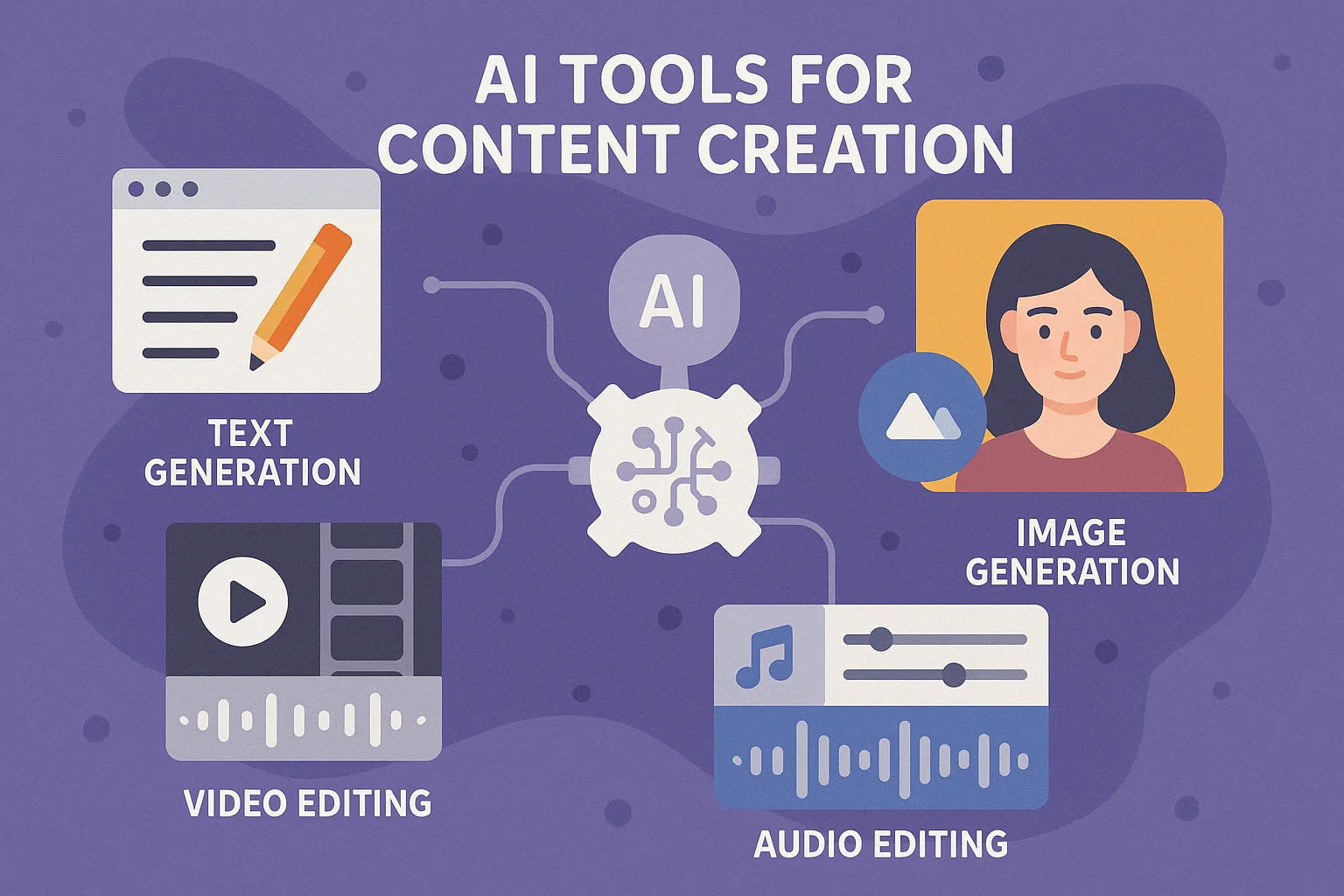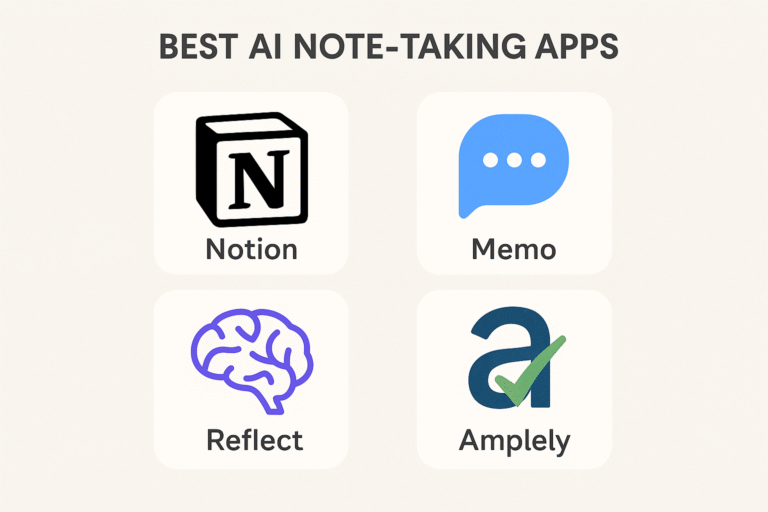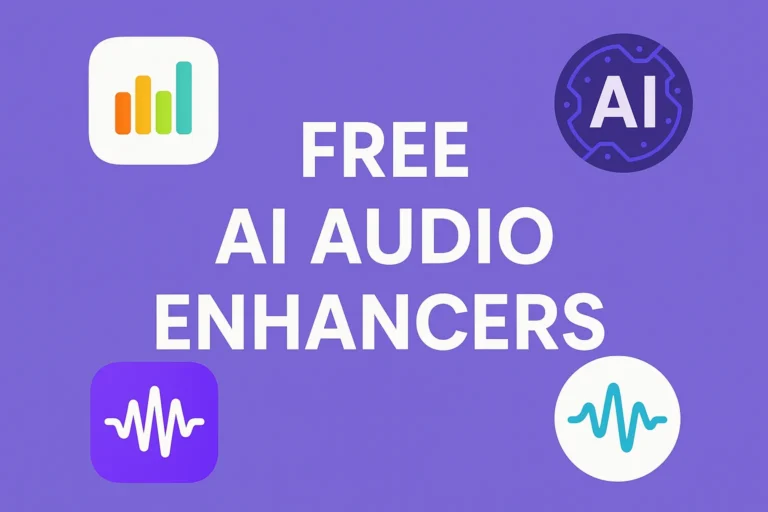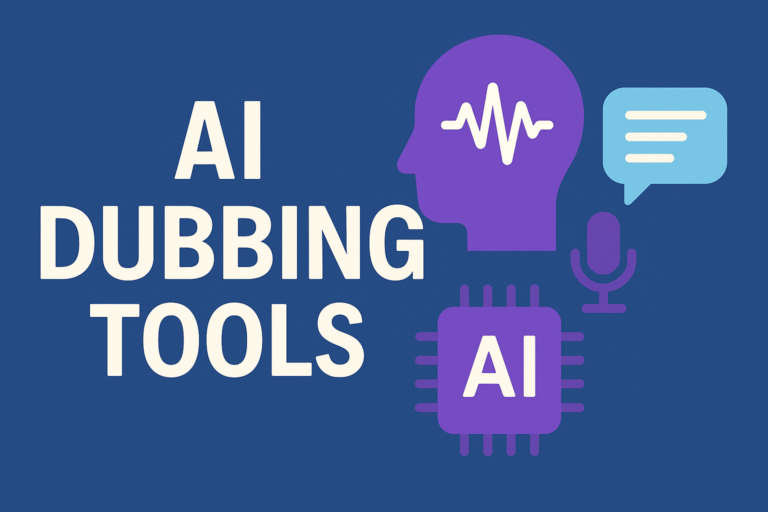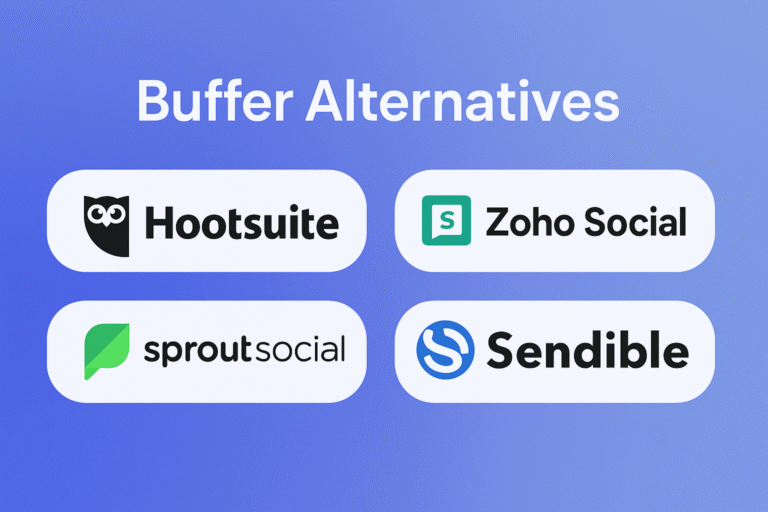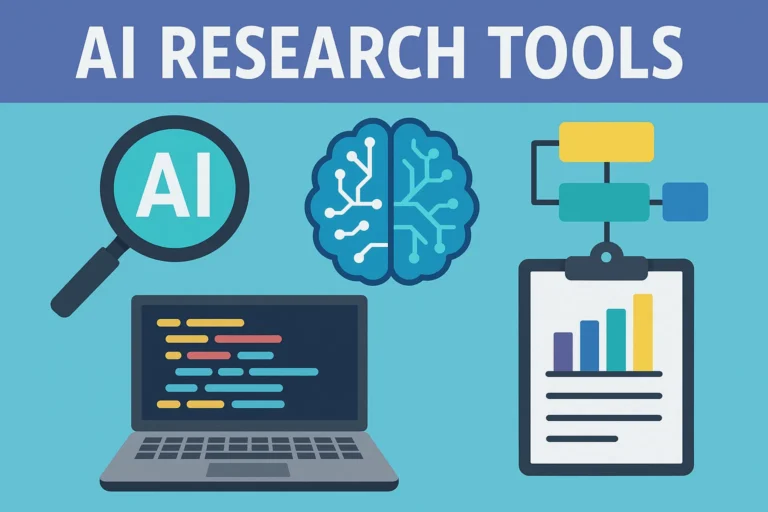Are you spending countless hours creating content, struggling to meet deadlines, or feeling creatively stuck? Do you find yourself overwhelmed by the sheer volume of content your business or personal brand demands across different platforms and formats?
You’re facing the same challenge millions of creators encounter daily. The modern content landscape demands consistent, high-quality output across multiple channels—blog posts, social media, videos, podcasts, graphics, and more. Traditional content creation methods simply can’t keep pace with these demands.
Enter AI-powered content creation tools. These revolutionary platforms can help you generate ideas, create drafts, enhance quality, and automate repetitive tasks—all while maintaining your unique voice and style. The result? You can produce more content in less time without sacrificing quality.
In this comprehensive guide, I’ll walk you through 25 cutting-edge AI tools that are transforming content creation in 2025. From writing assistants to video generators, from graphic design to podcast creation, you’ll discover the exact tools that can supercharge your content production and help you stay ahead of the competition.
The Content Creation Revolution: Why AI Tools Are Game-Changers
Before diving into specific tools, let’s understand why AI has become indispensable for modern content creators:
Productivity Explosion: AI tools can reduce content creation time by 60-80% while maintaining quality standards.
Creative Block Solutions: When inspiration runs dry, AI provides fresh perspectives and idea generation capabilities.
Quality Consistency: AI helps maintain consistent quality and style across large volumes of content.
Multi-Format Efficiency: Create content for multiple platforms and formats from a single source.
Cost Effectiveness: Reduce dependency on expensive freelancers and agencies for routine content tasks.
Scalability: Handle increased content demands without proportionally increasing resources.
24/7 Availability: Generate content anytime without waiting for human collaborators.
Understanding AI Content Creation Categories
AI content creation tools fall into several categories, each addressing specific aspects of the content production process:
1. Text Generation and Writing
Tools that help with blog posts, articles, copy, and written content
2. Visual Content Creation
AI-powered graphic design, image generation, and visual enhancement tools
3. Video and Animation
Platforms for creating videos, animations, and moving visual content
4. Audio and Voice
Voice generation, music creation, and podcast production tools
5. Research and Planning
AI assistants for content research, SEO optimization, and strategic planning
6. Social Media Management
Specialized tools for social media content creation and management
7. Website and Digital Asset Creation
Platforms for building websites, landing pages, and digital resources
Quick Comparison: Top 25 AI Content Creation Tools
| Tool | Category | Best For | Starting Price | Key Strength |
| GPT-4/ChatGPT | Writing | General content | $20/month | Versatility |
| Claude | Writing | Long-form content | $20/month | Context length |
| Jasper | Writing | Marketing copy | $49/month | Brand voice |
| Copy.ai | Writing | Sales content | Free | Conversion focus |
| Writesonic | Writing | SEO content | $13/month | SEO optimization |
| Midjourney | Visual | Artistic images | $10/month | Art quality |
| DALL-E 3 | Visual | Realistic images | $20/month | Realism |
| Canva AI | Visual | Design templates | Free | Ease of use |
| Adobe Firefly | Visual | Creative suite integration | $4.99/month | Adobe integration |
| Stable Diffusion | Visual | Open source | Free | Customization |
| RunwayML | Video | AI video editing | $15/month | Video effects |
| Synthesia | Video | AI avatars | $30/month | Professional avatars |
| Loom AI | Video | Screen recording | $8/month | Workflow integration |
| Pictory | Video | Text-to-video | $19/month | Ease of use |
| InVideo | Video | Marketing videos | $15/month | Templates |
| ElevenLabs | Audio | Voice synthesis | $5/month | Voice quality |
| Murf | Audio | Professional voiceovers | $13/month | Business focus |
| Soundraw | Audio | Music generation | $16.99/month | Royalty-free music |
| Descript | Audio | Podcast editing | $12/month | Text-based editing |
| Riverside | Audio | Remote recording | $15/month | Audio quality |
| Surfer SEO | Research | SEO optimization | $69/month | SEO insights |
| MarketMuse | Research | Content strategy | $7,200/year | Strategic planning |
| BuzzSumo | Research | Content research | $199/month | Trend analysis |
| Hootsuite AI | Social Media | Multi-platform management | $99/month | Platform integration |
| Buffer AI | Social Media | Social scheduling | $5/month | Simplicity |
Best AI Writing and Text Generation Tools
1. GPT-4 (ChatGPT Plus) – The Versatile Powerhouse
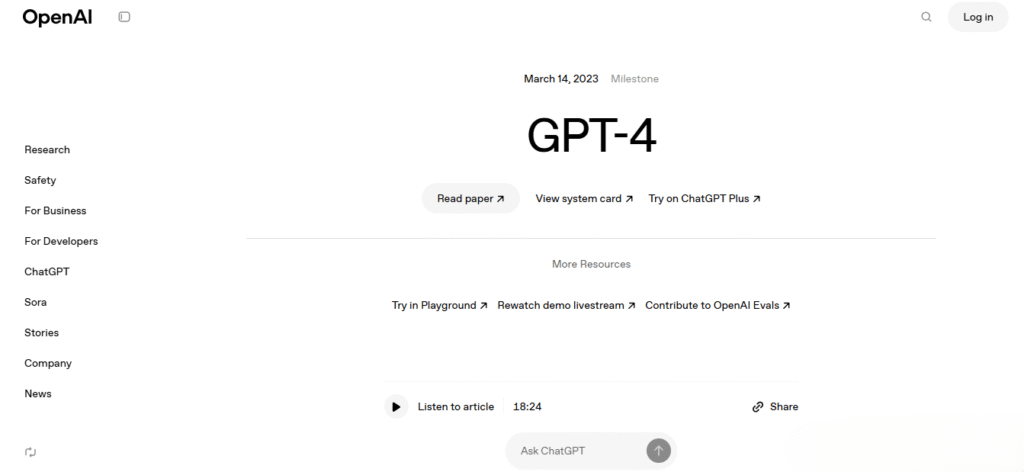
Best for: General content creation, brainstorming, diverse writing tasks
GPT-4 remains the most versatile AI writing tool available, capable of handling everything from creative writing to technical documentation with remarkable quality.
Key Features:
- Advanced Reasoning: Superior logic and contextual understanding
- Multi-format Output: Articles, emails, scripts, poetry, code, and more
- Custom Instructions: Personalize responses to match your style
- Plugin Ecosystem: Extend capabilities with specialized plugins
- Image Analysis: Process and describe uploaded images
- Code Generation: Create and debug code across multiple languages
Strengths:
- Exceptional versatility across content types
- High-quality, coherent long-form content
- Strong reasoning and problem-solving abilities
- Regular updates and improvements
- Large, active community
Limitations:
- Knowledge cutoff limitations
- Usage caps during peak times
- Requires careful prompting for best results
- No native SEO optimization features
Pricing:
- ChatGPT Plus: $20/month
- API pricing varies by usage
Best Use Cases:
- Blog post creation and ideation
- Marketing copy and email campaigns
- Creative writing and storytelling
- Technical documentation
- Educational content development
2. Claude (Anthropic) – The Long-Form Content Master

Best for: Research-heavy content, long-form articles, academic writing
Claude excels at handling complex, nuanced content creation tasks, particularly those requiring extensive context and careful reasoning.
Key Features:
- Massive Context Window: Process up to 200,000 tokens in one conversation
- Document Analysis: Upload and analyze research documents, PDFs, and data
- Ethical AI: Built with safety and helpfulness as core principles
- Code Understanding: Excellent at technical writing and code documentation
- Research Integration: Synthesize information from multiple sources
Strengths:
- Exceptional for long-form, research-heavy content
- Superior context retention across lengthy conversations
- High-quality, nuanced writing
- Strong ethical guidelines prevent harmful content
- Excellent for academic and professional writing
Limitations:
- No real-time web access
- Limited availability in some regions
- Can be slower for simple, quick tasks
- Less creative for artistic content
Pricing:
- Free tier available
- Claude Pro: $20/month
3. Jasper – The Marketing Copy Specialist
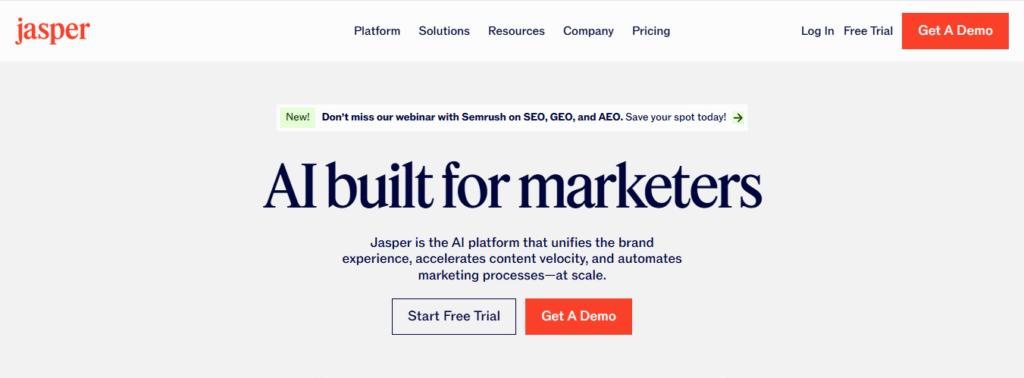
Best for: Marketing teams, agencies, brand-consistent content
Jasper has established itself as the premier AI writing tool for marketing professionals, offering specialized templates and brand voice training.
Key Features:
- Brand Voice Training: Learn and maintain your unique brand voice
- Marketing Templates: Pre-built templates for ads, emails, social posts
- Team Collaboration: Multi-user workspaces with role-based permissions
- SEO Mode: Integrated keyword optimization and content scoring
- Plagiarism Checker: Ensure content originality
- Chrome Extension: Generate content within other platforms
Strengths:
- Exceptional for marketing and sales content
- Consistent brand voice across all content
- Strong team collaboration features
- Proven ROI for marketing teams
- Extensive template library
Limitations:
- Higher cost than general-purpose alternatives
- Less versatile for non-marketing content
- Learning curve for advanced features
- Subscription-based pricing only
Pricing:
- Creator: $49/month
- Teams: $125/month
- Business: Custom pricing
4. Copy.ai – The Conversion-Focused Assistant
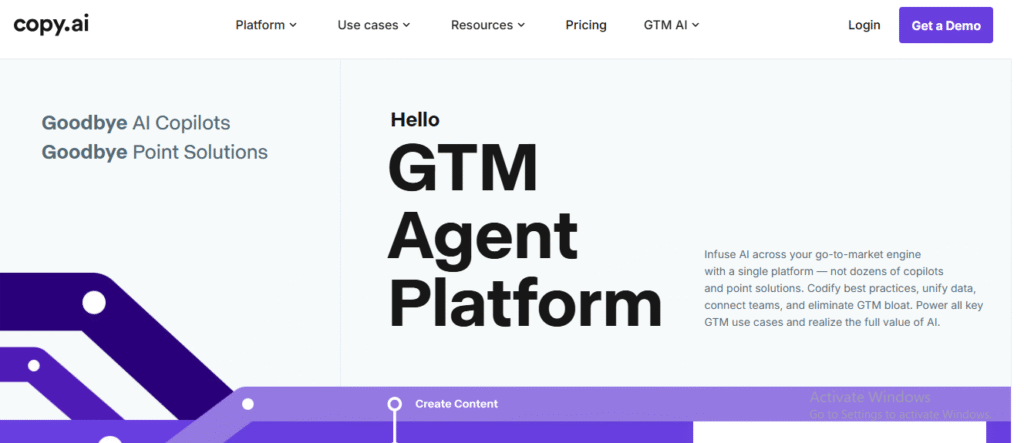
Best for: Sales teams, conversion optimization, e-commerce
Copy.ai has evolved into a comprehensive platform focused on creating content that converts, with specialized tools for sales and marketing automation.
Key Features:
- Sales Focus: Templates and workflows designed for conversion
- Workflow Automation: Create automated content generation sequences
- A/B Testing: Generate multiple variations for testing
- CRM Integration: Connect with popular sales and marketing platforms
- Performance Tracking: Monitor content performance and optimization
Strengths:
- Strong focus on conversion and sales outcomes
- Excellent automation capabilities
- Good integration with sales tools
- Free tier available
- Active community and support
Limitations:
- Less suitable for creative or educational content
- Advanced features require paid plans
- Learning curve for automation features
- Can produce formulaic content
Pricing:
- Free: Limited features
- Pro: $36/month
- Team: $186/month
5. Writesonic – The SEO Content Creator
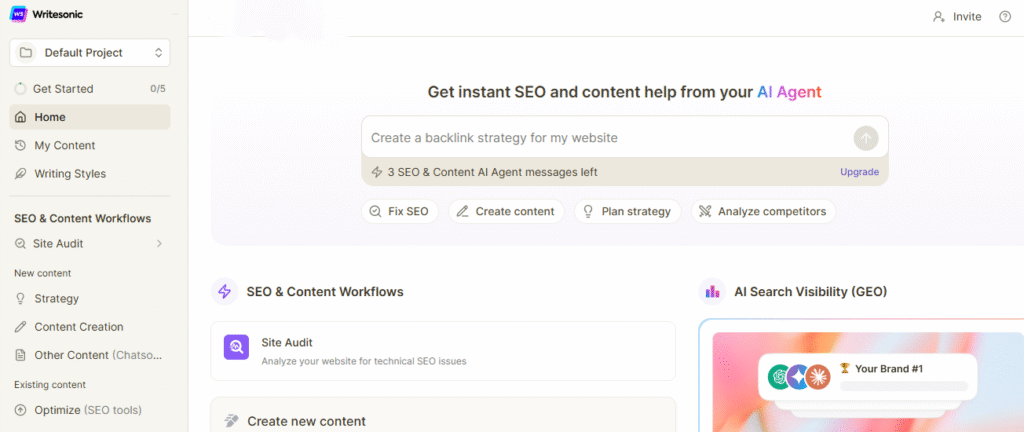
Best for: SEO content, blog creation, search optimization
Writesonic combines AI writing with built-in SEO optimization, making it ideal for creating content that ranks well in search engines.
Key Features:
- SEO Optimization: Built-in keyword research and optimization
- Fact-Checking: Real-time information verification
- Bulk Content: Generate multiple pieces simultaneously
- WordPress Integration: Direct publishing to WordPress sites
- Competitor Analysis: Analyze and improve upon competitor content
- Multi-language Support: Create content in 25+ languages
Strengths:
- Strong SEO focus with built-in optimization
- Real-time web access for current information
- Good value for money
- Bulk content generation capabilities
- WordPress integration
Limitations:
- Quality can vary for creative content
- Interface can be overwhelming for beginners
- Limited customization compared to premium alternatives
- Credit-based usage system
Pricing:
- Free: Limited features
- Small Team: $13/month
- Freelancer: $16/month
- Enterprise: Custom pricing
Best AI Visual Content Creation Tools
1. Midjourney – The Artistic Excellence Leader
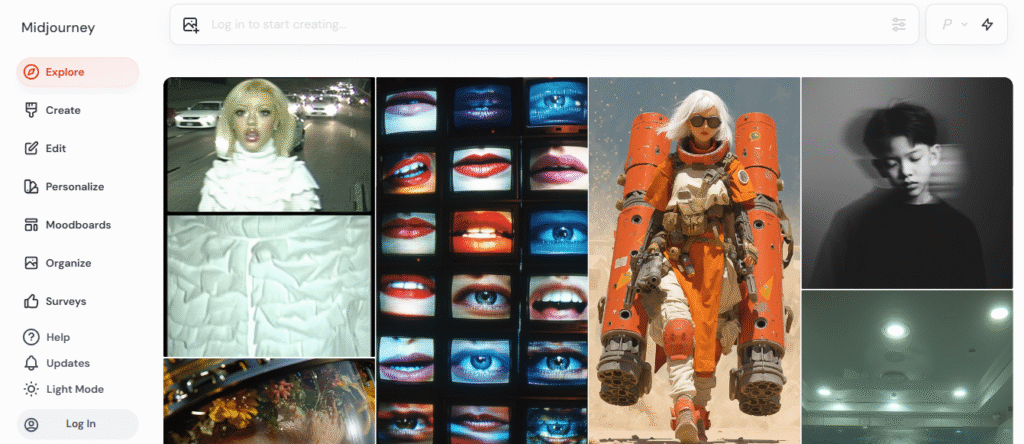
Best for: Artistic content, creative projects, unique visual styles
Midjourney has revolutionized AI image generation with its focus on artistic quality and unique aesthetic capabilities.
Key Features:
- Artistic Style: Exceptional quality for creative and artistic images
- Style Consistency: Maintain consistent visual styles across projects
- Community Platform: Discord-based interface with active community
- Version Control: Multiple model versions for different artistic approaches
- Commercial Rights: Use generated images for commercial purposes
Strengths:
- Best-in-class artistic image quality
- Strong creative community
- Regular model improvements
- Unique aesthetic capabilities
- Good commercial licensing
Limitations:
- Discord-only interface can be confusing
- No direct API access
- Limited control over specific details
- Subscription required for full features
Pricing:
- Basic: $10/month
- Standard: $30/month
- Pro: $60/month
2. DALL-E 3 (OpenAI) – The Realistic Image Generator
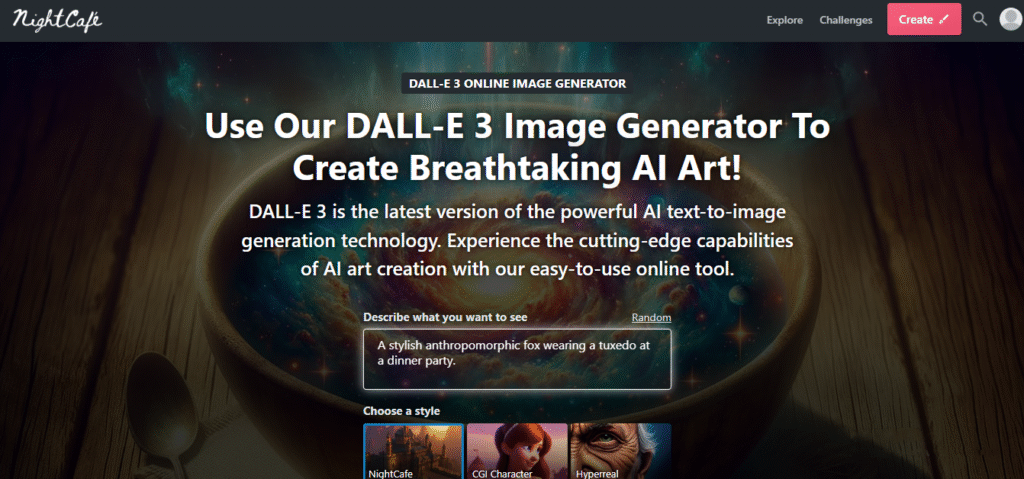
Best for: Realistic images, product mockups, photographic styles
DALL-E 3 excels at creating realistic, photographic-quality images with excellent prompt following and safety features.
Key Features:
- Photorealistic Quality: Exceptional realistic image generation
- Prompt Adherence: Follows complex prompts accurately
- Safety Features: Built-in content policy enforcement
- Integration Options: Available through ChatGPT Plus and API
- Edit Capabilities: Modify and refine generated images
Strengths:
- Excellent realistic image quality
- Strong safety and content policies
- Good prompt understanding
- Integration with ChatGPT ecosystem
- Regular quality improvements
Limitations:
- More expensive than some alternatives
- Strict content policies may limit creative freedom
- Limited artistic styles compared to Midjourney
- Usage limits on paid plans
Pricing:
- ChatGPT Plus: $20/month (includes DALL-E 3 access)
- API: Pay-per-use pricing
3. Canva AI – The Design Template Master
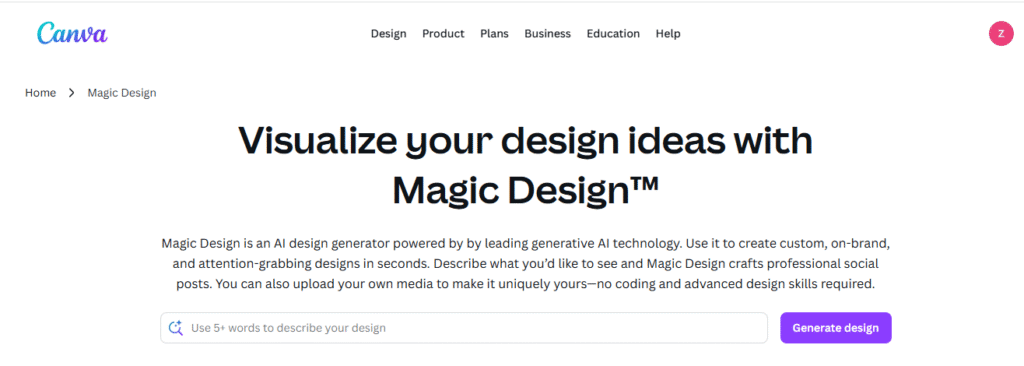
Best for: Social media graphics, marketing materials, non-designers
Canva AI democratizes professional design by combining AI generation with professional templates and design tools.
Key Features:
- Template Integration: AI generation within professional design templates
- Brand Kit: Maintain consistent branding across all designs
- Magic Resize: Automatically adapt designs for different platforms
- Background Remover: AI-powered background editing
- Text Effects: Advanced typography with AI assistance
- Team Collaboration: Share and collaborate on designs
Strengths:
- Incredibly user-friendly for non-designers
- Extensive template library
- Strong brand consistency features
- Good free tier
- Excellent team collaboration
Limitations:
- Less flexibility than specialized AI art tools
- Limited creative control for advanced users
- Subscription required for advanced features
- Can produce template-looking designs
Pricing:
- Free: Limited features
- Pro: $15/month
- Teams: $20/month per person
4. Adobe Firefly – The Creative Suite Integrator
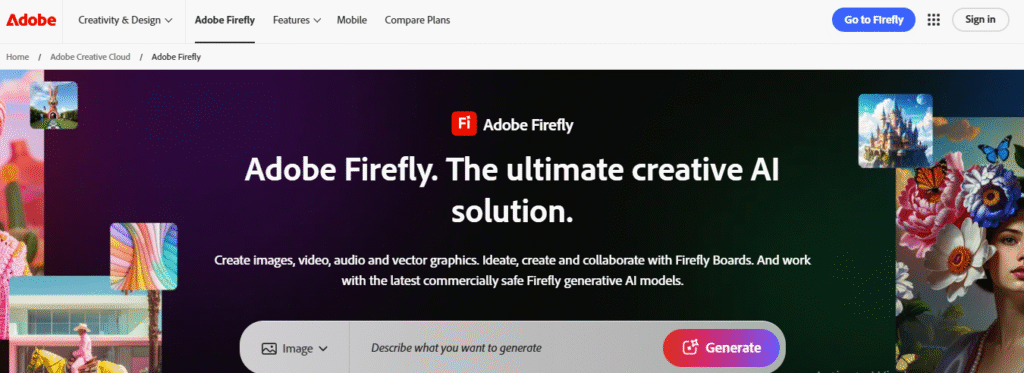
Best for: Adobe users, professional workflows, creative projects
Adobe Firefly brings AI generation directly into the Adobe Creative Suite, offering seamless integration with professional creative workflows.
Key Features:
- Creative Cloud Integration: Native integration with Photoshop, Illustrator, and more
- Style Matching: Generate content that matches existing brand styles
- Vector Generation: Create scalable vector graphics with AI
- Text Effects: Advanced AI-powered typography effects
- Commercial Safety: Trained on licensed content for commercial use
Strengths:
- Seamless Adobe ecosystem integration
- Professional-grade output quality
- Commercial licensing clarity
- Regular updates and improvements
- Strong customer support
Limitations:
- Requires Adobe subscription for full features
- Learning curve for non-Adobe users
- Higher cost than standalone alternatives
- Limited availability in some regions
Pricing:
- Included with Adobe Creative Cloud subscriptions
- Standalone: $4.99/month
5. Stable Diffusion – The Open Source Pioneer
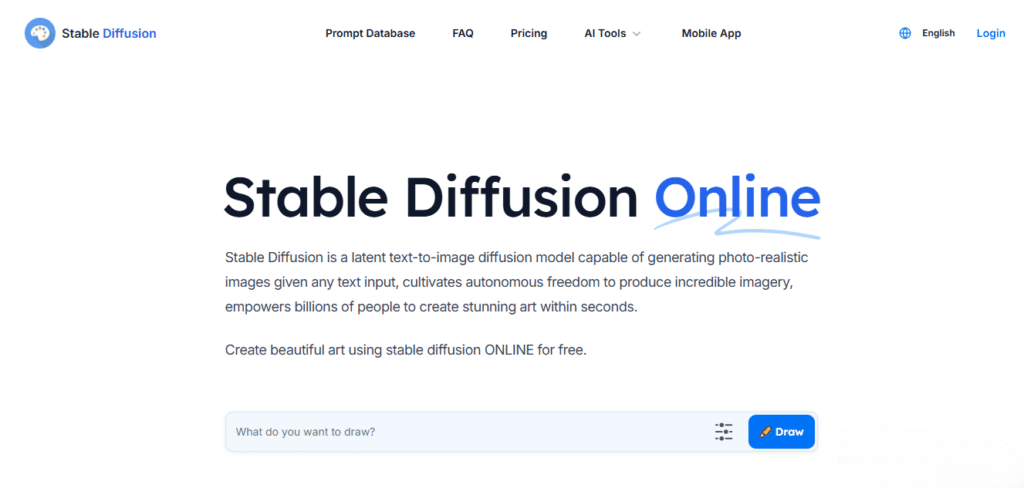
Best for: Developers, customization needs, unlimited usage
Stable Diffusion offers unparalleled flexibility and customization options through its open-source nature, making it perfect for users who need complete control.
Key Features:
- Open Source: Complete access to source code and models
- Custom Training: Train models on your specific content and style
- Local Processing: Run entirely on your own hardware
- Unlimited Usage: No subscription fees or usage limits
- Community Models: Access thousands of community-created models
- API Integration: Build custom applications and workflows
Strengths:
- Completely free and open source
- Unlimited customization possibilities
- No usage restrictions
- Strong developer community
- Local processing for privacy
Limitations:
- Requires technical knowledge to set up
- Needs powerful hardware for optimal performance
- No customer support
- Interface complexity for casual users
Pricing:
- Completely free (requires hardware and technical setup)
Best AI Video Creation Tools
1. RunwayML – The Creative Video Innovator
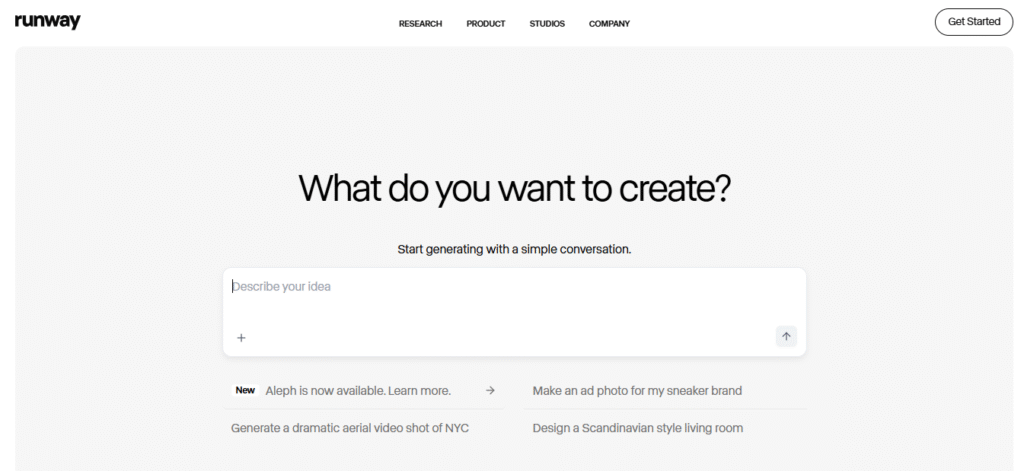
Best for: Creative video projects, experimental content, AI effects
RunwayML pushes the boundaries of AI video creation with cutting-edge features that enable entirely new forms of creative expression.
Key Features:
- Text-to-Video: Generate videos from written descriptions
- Video Editing AI: AI-powered editing and enhancement tools
- Style Transfer: Apply artistic styles to video content
- Object Removal: Remove unwanted elements from video
- Green Screen AI: Automatic background replacement
- Collaboration Tools: Team-based video projects
Strengths:
- Cutting-edge AI video capabilities
- Strong creative community
- Regular feature updates
- High-quality outputs
- Good educational resources
Limitations:
- Steep learning curve
- Higher pricing for advanced features
- Requires good hardware for complex projects
- Limited template library
Pricing:
- Free: Limited features
- Standard: $15/month
- Pro: $35/month
- Unlimited: $95/month
2. Synthesia – The Professional Avatar Platform
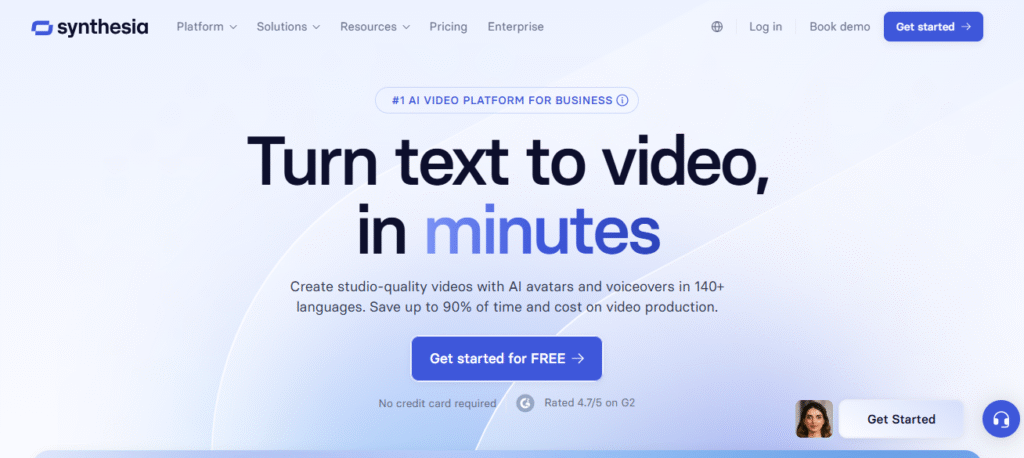
Best for: Corporate training, professional presentations, multilingual content
Synthesia excels at creating professional video content with AI avatars, making it perfect for business communications and training materials.
Key Features:
- AI Avatars: 120+ realistic AI presenters
- Multilingual Support: Generate content in 120+ languages
- Custom Avatars: Create avatars from your own footage
- Template Library: Professional video templates
- Team Collaboration: Multi-user workspaces and approval workflows
- API Integration: Automate video creation through API
Strengths:
- Professional-quality AI avatars
- Excellent for business and educational content
- Strong multilingual capabilities
- Good template library
- Reliable customer support
Limitations:
- High cost for individual creators
- Limited creative flexibility
- Avatar movements can seem artificial
- Subscription-based pricing only
Pricing:
- Personal: $30/month
- Corporate: $90/month
- Enterprise: Custom pricing
3. Pictory – The Text-to-Video Converter
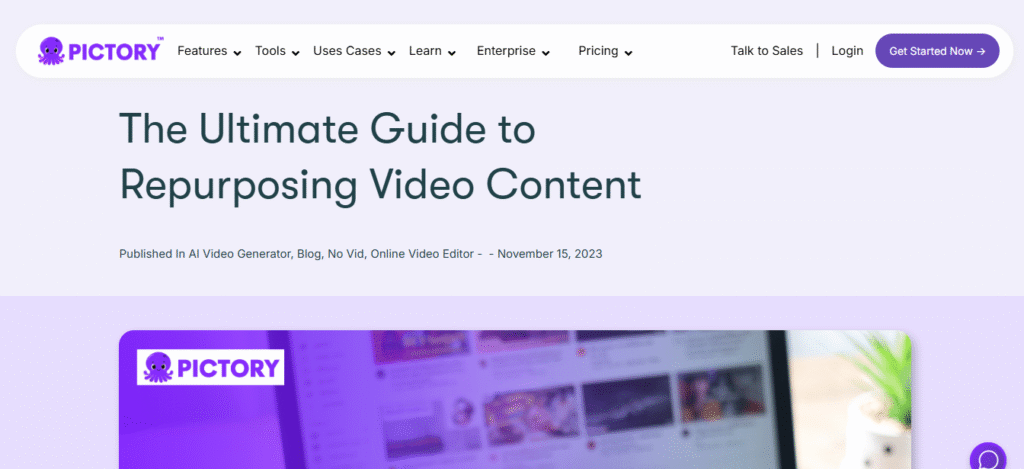
Best for: Blog-to-video conversion, social media content, marketing videos
Pictory specializes in converting text content into engaging videos, making it perfect for repurposing existing written content.
Key Features:
- Blog-to-Video: Automatically convert blog posts into videos
- Script-to-Video: Create videos from written scripts
- Video Summarization: Extract highlights from longer videos
- Stock Media: Access to millions of stock images and videos
- Automatic Subtitles: AI-generated captions and subtitles
- Brand Customization: Consistent branding across all videos
Strengths:
- Excellent for content repurposing
- User-friendly interface
- Good stock media library
- Automatic subtitle generation
- Reasonable pricing
Limitations:
- Limited creative control over visual style
- Template-based approach may feel restrictive
- Quality varies with source content
- Limited advanced editing features
Pricing:
- Standard: $19/month
- Premium: $39/month
- Teams: $99/month
4. InVideo – The Marketing Video Specialist
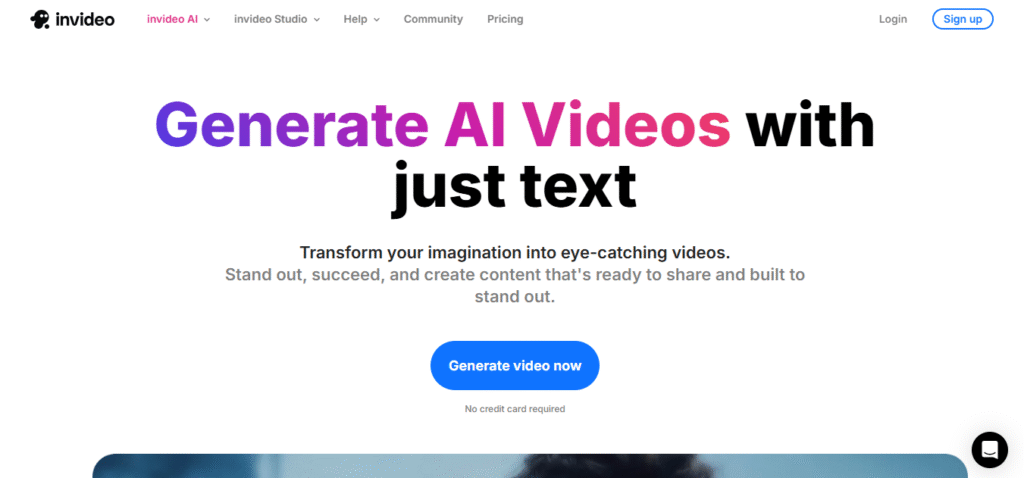
Best for: Marketing campaigns, promotional content, social media videos
InVideo combines AI assistance with a comprehensive video creation platform, focusing on marketing and promotional content.
Key Features:
- AI Video Assistant: Generate videos from text prompts
- Template Library: 5000+ professional video templates
- Text-to-Video: Convert articles and scripts into videos
- Voice Generation: AI-powered voiceovers in multiple languages
- Brand Presets: Maintain consistent branding across videos
- Social Media Optimization: Templates optimized for different platforms
Strengths:
- Extensive template library
- Good AI integration with traditional editing
- Strong marketing focus
- Multi-platform optimization
- Competitive pricing
Limitations:
- Can feel template-heavy
- Limited advanced editing capabilities
- Learning curve for complex projects
- Watermarks on lower-tier plans
Pricing:
- Free: Limited features with watermarks
- Plus: $15/month
- Max: $30/month
5. Loom AI – The Workflow Video Creator
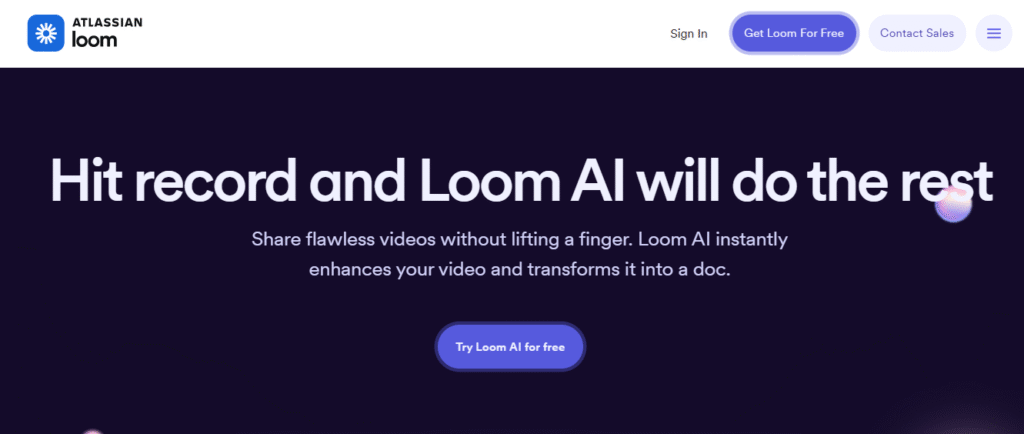
Best for: Internal communications, tutorials, workflow documentation
Loom AI enhances the popular screen recording platform with AI features for creating professional communication and training videos.
Key Features:
- Screen Recording: Capture screen activity with AI enhancement
- AI Summaries: Automatically generate video summaries
- Transcript Generation: Accurate, searchable video transcripts
- Action Items: Extract tasks and follow-ups from recordings
- Video Editing: AI-assisted editing and enhancement
- Integration Ecosystem: Connect with popular business tools
Strengths:
- Excellent for business communication
- Strong integration with workflow tools
- User-friendly interface
- Good collaboration features
- Practical AI enhancements
Limitations:
- Focused primarily on screen recording
- Limited creative video features
- Subscription required for advanced AI features
- Not ideal for marketing or promotional content
Pricing:
- Free: Basic features
- Business: $8/month
- Enterprise: $12/month
Best AI Audio and Voice Creation Tools
1. ElevenLabs – The Voice Synthesis Pioneer
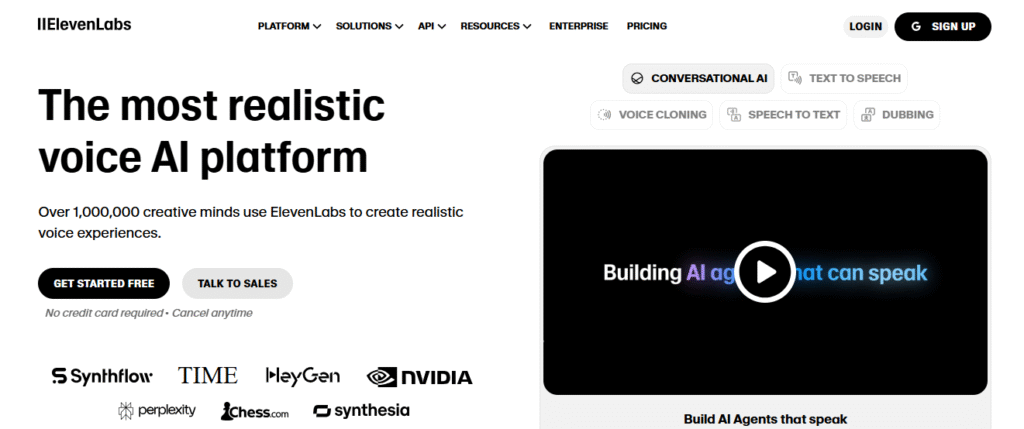
Best for: Podcast creation, audiobook narration, multilingual content
ElevenLabs has set the standard for AI voice generation with incredibly realistic voice synthesis and advanced customization options.
Key Features:
- Voice Cloning: Create custom voices from audio samples
- Multilingual Support: Generate speech in 29+ languages
- Emotion Control: Adjust tone, pace, and emotional expression
- Long-Form Audio: Generate extended audio content efficiently
- Voice Library: Access professional voice actors’ AI models
- API Integration: Embed voice generation into applications
Strengths:
- Best-in-class voice quality and realism
- Excellent emotion and tone control
- Strong multilingual capabilities
- Good API for developers
- Regular model improvements
Limitations:
- Higher pricing for extensive usage
- Ethical considerations around voice cloning
- Internet connection required
- Limited free tier
Pricing:
- Free: 10,000 characters/month
- Starter: $5/month
- Creator: $22/month
- Pro: $99/month
2. Murf – The Professional Voiceover Platform
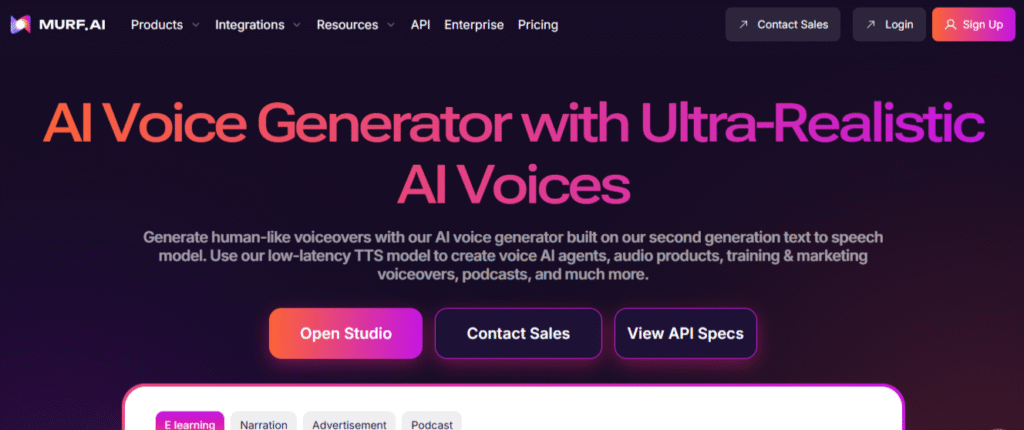
Best for: Business presentations, e-learning, professional content
Murf focuses on professional-quality voiceovers for business and educational applications, offering studio-grade results without the complexity.
Key Features:
- Professional Voices: 120+ high-quality AI voices
- Voice Customization: Adjust pitch, speed, and emphasis
- Script Editor: Advanced text editing with voice previews
- Collaboration Tools: Team workspaces and project sharing
- Background Music: Royalty-free music library integration
- Export Options: Multiple audio formats and quality settings
Strengths:
- Professional-quality voice output
- User-friendly interface
- Good collaboration features
- Comprehensive music library
- Reliable customer support
Limitations:
- More expensive than some alternatives
- Limited voice customization compared to ElevenLabs
- Subscription-based pricing only
- Fewer creative voice options
Pricing:
- Basic: $13/month
- Pro: $26/month
- Enterprise: $52/month
3. Soundraw – The AI Music Composer
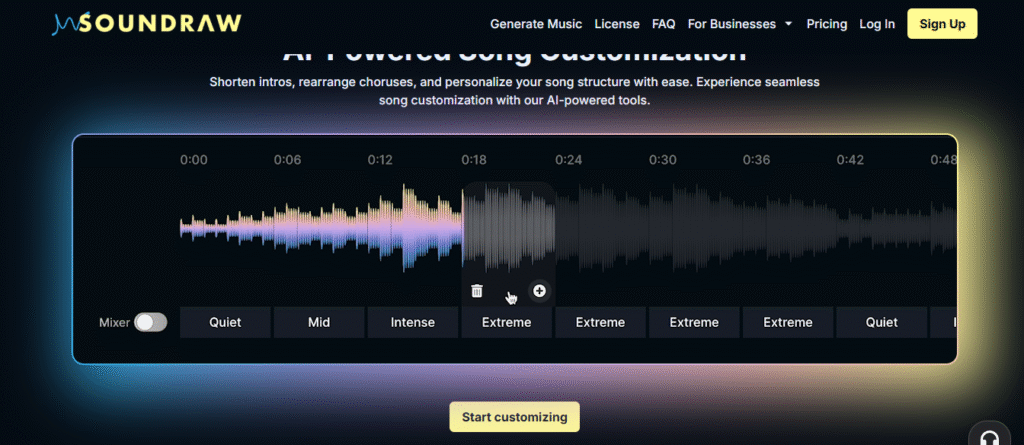
Best for: Background music, royalty-free content, customizable tracks
Soundraw enables creators to generate completely original, royalty-free music tailored to their specific needs and preferences.
Key Features:
- Custom Music Generation: Create original tracks based on mood, genre, and length
- Royalty-Free Guarantee: Use generated music without licensing concerns
- Customization Controls: Adjust tempo, instruments, and musical elements
- Unlimited Downloads: Generate and download unlimited tracks
- Commercial License: Use music for commercial projects without restrictions
- API Access: Integrate music generation into applications
Strengths:
- Completely original, royalty-free music
- Highly customizable output
- Unlimited usage with subscription
- Good quality for AI-generated music
- Clear commercial licensing
Limitations:
- Music quality still below professional composers
- Limited genres compared to stock music libraries
- Learning curve for musical customization
- Subscription required for unlimited access
Pricing:
- Free: Limited features
- Creator: $16.99/month
- Artist: $29.99/month
Best AI Research and SEO Tools
1. Surfer SEO – The Content Optimization Expert
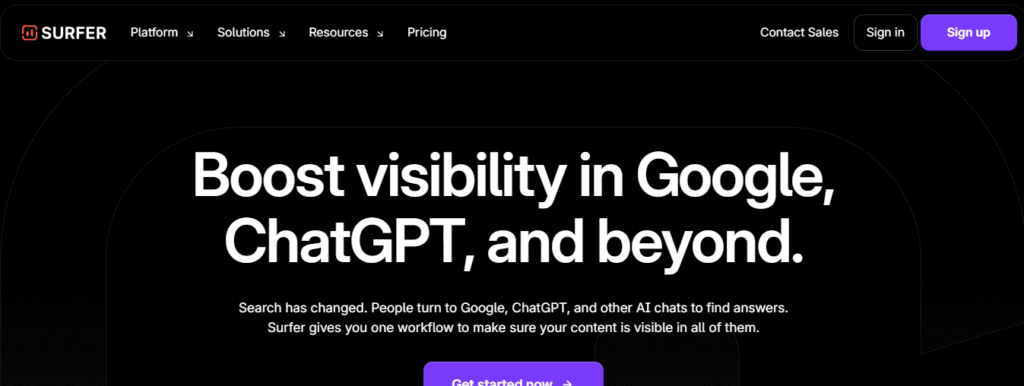
Best for: SEO content creation, search optimization, competitive analysis
Surfer SEO combines AI writing with comprehensive SEO analysis, helping you create content that ranks while maintaining quality.
Key Features:
- Content Editor: Real-time SEO scoring and optimization
- Keyword Research: AI-powered keyword discovery and analysis
- SERP Analysis: Detailed analysis of ranking factors
- Content Planning: Strategic content calendar creation
- Competitor Research: Analyze successful competitor content
- Team Collaboration: Multi-user workspaces and workflow management
Strengths:
- Exceptional SEO optimization capabilities
- Data-driven content recommendations
- Strong competitive analysis features
- Professional-grade insights
- Regular algorithm updates
Limitations:
- High cost for individual creators
- Steep learning curve
- Requires SEO knowledge to maximize value
- Limited creative writing assistance
Pricing:
- Essential: $69/month
- Scale: $149/month
- Scale AI: $219/month
2. MarketMuse – The Content Strategy Platform
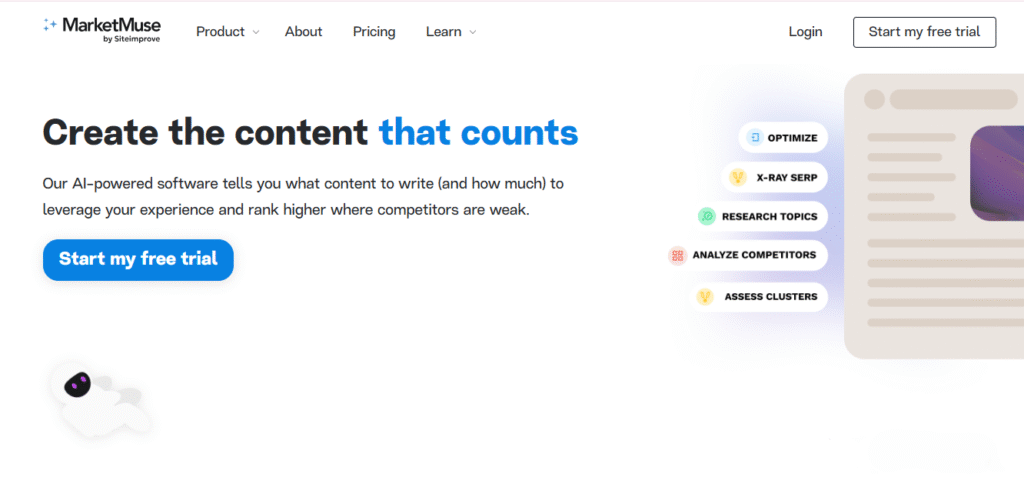
Best for: Enterprise content strategy, comprehensive content planning
MarketMuse uses AI to analyze your entire content landscape and provide strategic recommendations for content creation and optimization.
Key Features:
- Content Inventory: Analyze your complete content portfolio
- Topic Modeling: Identify content gaps and opportunities
- Competitive Intelligence: Deep analysis of competitor content strategies
- Content Briefs: AI-generated briefs for writers and creators
- Performance Prediction: Forecast content performance before publication
- Team Collaboration: Enterprise-grade workflow management
Strengths:
- Comprehensive content strategy insights
- Enterprise-grade analytics
- Excellent for large content teams
- Data-driven decision making
- Strong ROI for large organizations
Limitations:
- Very expensive for small businesses
- Complex interface requiring training
- Overkill for simple content needs
- Long implementation time
Pricing:
- Free: Limited features
- Standard: $7,200/year
- Team: Custom pricing
3. BuzzSumo – The Content Research Intelligence Tool
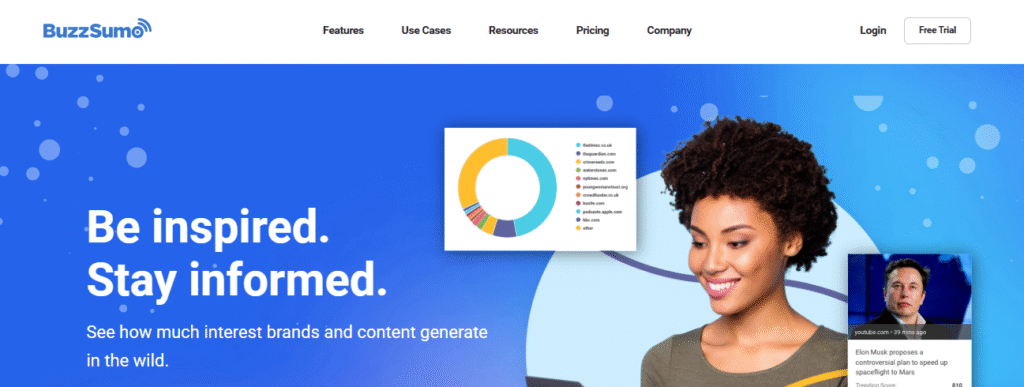
Best for: Content research, trend analysis, influencer identification
BuzzSumo combines AI with social media data to provide insights into content performance, trends, and audience engagement.
Key Features:
- Content Analysis: Discover trending content in your industry
- Influencer Research: Identify key influencers and content creators
- Competitor Monitoring: Track competitor content performance
- Trend Identification: Spot emerging topics and trends
- Content Alerts: Monitor mentions and content opportunities
- Performance Prediction: Analyze factors that drive content success
Strengths:
- Excellent for content research and strategy
- Comprehensive social media analytics
- Strong trend identification capabilities
- Good influencer research features
- Regular data updates
Limitations:
- Expensive for individual creators
- Primarily research-focused, not creation
- Learning curve for advanced features
- Limited direct content creation capabilities
Pricing:
- Pro: $199/month
- Plus: $399/month
- Large: $999/month
Best AI Social Media Management Tools
1. Hootsuite Insights – The Enterprise Social Platform
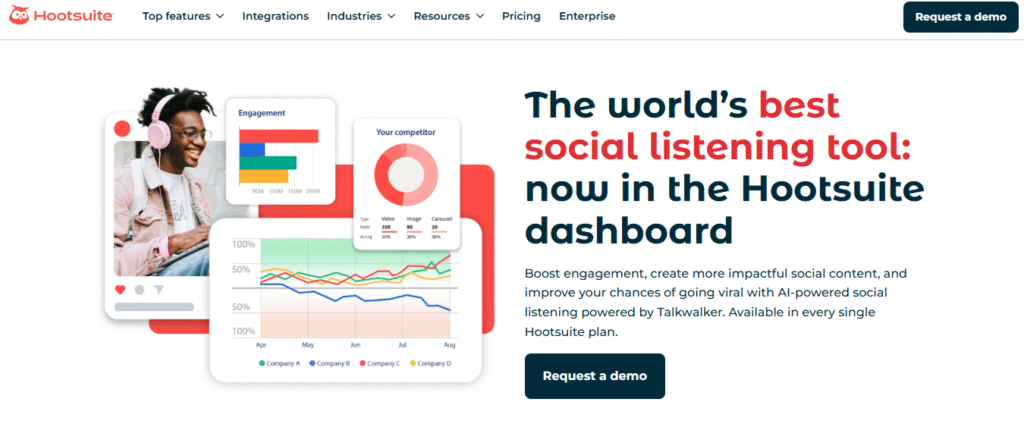
Best for: Large teams, multi-platform management, comprehensive analytics
Hootsuite has integrated AI throughout its platform to provide intelligent social media management for enterprises and agencies.
Key Features:
- AI Content Creation: Generate social media posts with AI assistance
- Smart Scheduling: AI-optimized posting times
- Sentiment Analysis: Monitor brand sentiment across platforms
- Content Curation: AI-powered content discovery and suggestion
- Team Collaboration: Advanced workflow management and approval processes
- Analytics Integration: AI-enhanced performance insights
Strengths:
- Comprehensive platform with AI enhancements
- Excellent for large teams and agencies
- Strong analytics and reporting
- Extensive platform integrations
- Professional customer support
Limitations:
- High cost for small businesses
- Complex interface with steep learning curve
- AI features spread across multiple modules
- May be overkill for simple social media needs
Pricing:
- Professional: $99/month
- Team: $249/month
- Enterprise: Custom pricing
2. Buffer AI – The Simplicity-Focused Solution
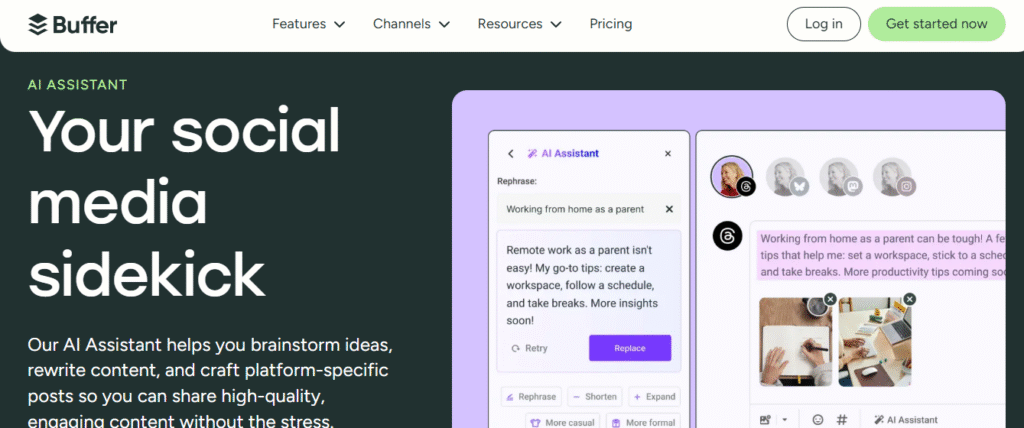
Best for: Small businesses, solopreneurs, straightforward social media management
Buffer has integrated AI features while maintaining its reputation for simplicity and ease of use.
Key Features:
- AI Assistant: Generate social media posts and captions
- Optimal Timing: AI-recommended posting schedules
- Hashtag Suggestions: Intelligent hashtag recommendations
- Content Repurposing: Transform long-form content into social posts
- Performance Analytics: AI-enhanced insights and recommendations
- Browser Extension: Create content directly from web pages
Strengths:
- Very user-friendly interface
- Good value for money
- Strong mobile apps
- Excellent customer support
- Generous free tier
Limitations:
- Limited advanced AI features
- Fewer analytics compared to enterprise solutions
- Basic team collaboration features
- Limited platform integrations
Pricing:
- Free: Limited features
- Essentials: $5/month per channel
- Team: $10/month per channel
- Agency: $100/month for 10 channels
Best AI Website and Digital Asset Creation Tools
1. Framer AI – The Advanced Web Design Platform

Best for: Professional websites, interactive design, advanced layouts
Framer AI combines sophisticated design capabilities with AI assistance to create professional, interactive websites.
Key Features:
- AI Website Generation: Create complete websites from text descriptions
- Interactive Components: Advanced animations and interactions
- Responsive Design: Automatic optimization for all devices
- CMS Integration: Dynamic content management capabilities
- Team Collaboration: Advanced design collaboration features
- Developer Handoff: Export code for development teams
Strengths:
- Professional-grade design capabilities
- Excellent for complex, interactive websites
- Strong developer features
- Good team collaboration
- High-quality output
Limitations:
- Steep learning curve for beginners
- Higher cost than simple website builders
- Requires design knowledge for best results
- Limited template library
Pricing:
- Free: Basic features
- Mini: $5/month
- Basic: $15/month
- Pro: $25/month
2. Webflow AI – The Designer’s Website Builder
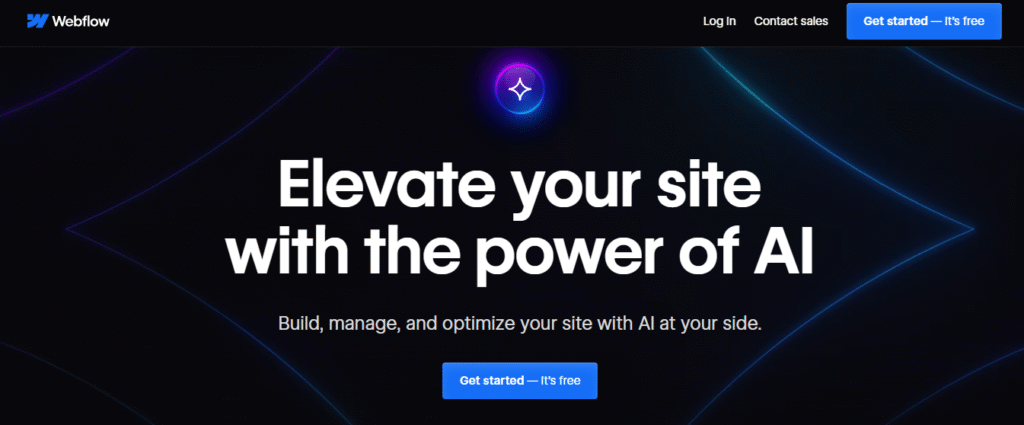
Best for: Professional web designers, custom websites, e-commerce
Webflow AI brings artificial intelligence to professional web design, enabling designers to create sophisticated websites more efficiently.
Key Features:
- AI-Powered Design: Generate layouts and components with AI
- Visual Development: Design and develop without coding
- CMS Capabilities: Dynamic content management system
- E-commerce Integration: Built-in e-commerce functionality
- SEO Optimization: Built-in SEO tools and optimization
- Hosting Included: Fast, reliable hosting infrastructure
Strengths:
- Professional-grade design freedom
- No coding required for complex functionality
- Excellent for e-commerce
- Strong SEO capabilities
- Good hosting performance
Limitations:
- Complex interface for beginners
- Higher learning curve than simple builders
- More expensive than basic alternatives
- Requires design sensibility for best results
Pricing:
- Free: Basic features
- Basic: $14/month
- CMS: $23/month
- Business: $39/month
Specialized AI Content Creation Tools
1. Gamma – The AI Presentation Creator
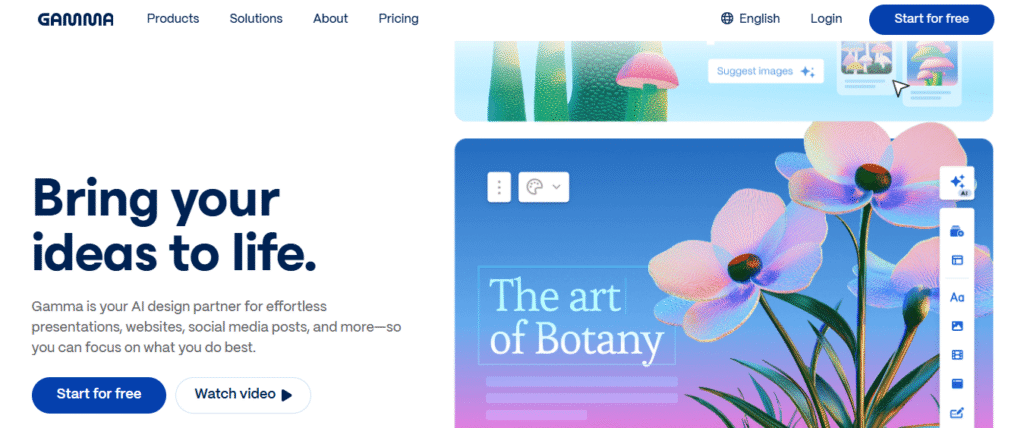
Best for: Presentations, slide decks, visual storytelling
Gamma revolutionizes presentation creation by generating complete slide decks from simple prompts or outlines.
Key Features:
- AI Presentation Generation: Create full presentations from text prompts
- Smart Templates: AI-selected templates based on content
- Automatic Formatting: Intelligent layout and design decisions
- Content Suggestions: AI recommendations for improving presentations
- Collaboration Features: Real-time editing and sharing
- Export Options: Multiple formats including PowerPoint and PDF
Strengths:
- Dramatically speeds up presentation creation
- Professional-quality output
- User-friendly interface
- Good collaboration features
- Regular template updates
Limitations:
- Limited customization compared to traditional tools
- Subscription required for full features
- May produce similar-looking presentations
- Limited integration with other tools
Pricing:
- Free: Limited features
- Plus: $10/month
- Pro: $20/month
2. Notion AI – The All-in-One Workspace Assistant
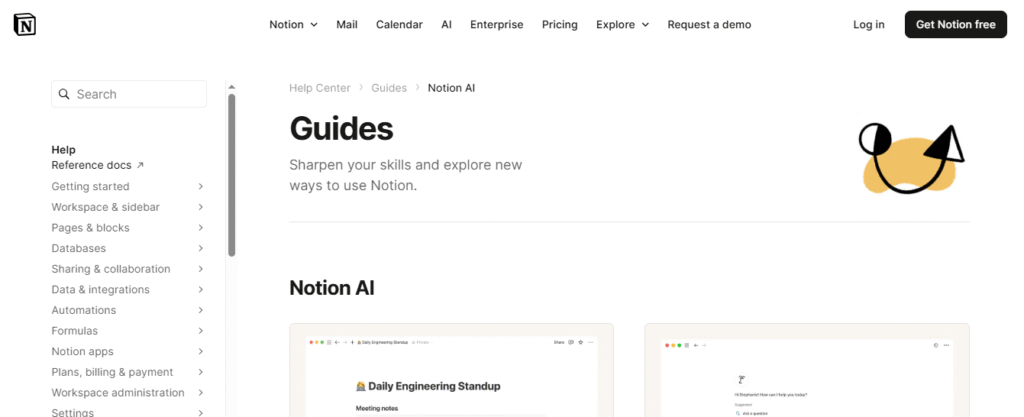
Best for: Knowledge management, team collaboration, integrated workflows
Notion AI integrates artificial intelligence into the popular workspace platform, enabling intelligent content creation within collaborative environments.
Key Features:
- Writing Assistant: Generate and improve content within Notion pages
- Database AI: Automatically populate and analyze database content
- Template Generation: Create page templates with AI assistance
- Content Summarization: Summarize long documents and meeting notes
- Translation: Translate content into multiple languages
- Task Automation: Automate routine content and data tasks
Strengths:
- Seamless integration with Notion workspace
- Good for team collaboration
- Versatile content creation capabilities
- Reasonable pricing
- Strong community and resources
Limitations:
- Requires familiarity with Notion platform
- AI features still developing
- Limited advanced content creation compared to specialized tools
- Dependency on Notion ecosystem
Pricing:
- Notion AI: $10/month per user (added to Notion plans)
Building Your AI Content Creation Workflow
Creating an effective AI-powered content workflow requires strategic thinking about how different tools complement each other:
Phase 1: Planning and Research
- Research Tools: Use BuzzSumo or MarketMuse for content strategy
- SEO Planning: Leverage Surfer SEO for keyword research and optimization
- Competitive Analysis: Analyze successful content in your niche
Phase 2: Content Creation
- Writing: Use GPT-4, Claude, or Jasper based on content type
- Visual Content: Generate images with Midjourney, DALL-E, or Canva AI
- Video Content: Create videos with RunwayML, Synthesia, or Pictory
- Audio Content: Generate voiceovers with ElevenLabs or Murf
Phase 3: Optimization and Enhancement
- SEO Optimization: Refine content with Surfer SEO or Writesonic
- Visual Enhancement: Upscale and enhance images with AI tools
- Editing and Refinement: Polish content with specialized editing AIs
Phase 4: Distribution and Management
- Social Media: Schedule and manage with Hootsuite AI or Buffer AI
- Website Publishing: Use AI website builders or CMS integrations
- Performance Tracking: Monitor results and iterate based on data
Advanced Strategies for AI Content Creation
1. Prompt Engineering Mastery
Be Specific: Provide detailed context, desired outcomes, and specific requirements
Use Examples: Show the AI what good output looks like with concrete examples
Iterate and Refine: Develop a library of effective prompts for different content types
Chain Prompts: Break complex tasks into sequential, manageable prompts
2. Brand Voice Consistency
Document Your Style: Create detailed brand voice guidelines for AI tools
Use Custom Instructions: Set up personalized instructions in AI platforms
Regular Calibration: Periodically review and adjust AI outputs to maintain consistency
Human Review: Always review AI-generated content before publication
3. Quality Assurance Processes
Multi-Tool Verification: Use different AI tools to cross-check important content
Human Oversight: Maintain human review for critical or sensitive content
Fact-Checking: Verify AI-generated facts and statistics with reliable sources
Plagiarism Checking: Use tools to ensure originality of AI-generated content
4. Workflow Automation
API Integration: Connect AI tools with your existing content management systems
Batch Processing: Use AI tools’ batch capabilities for efficiency
Template Creation: Develop reusable templates and workflows
Performance Monitoring: Track metrics to optimize your AI content strategy
Industry-Specific AI Content Strategies
E-commerce and Product Marketing
Content Needs: Product descriptions, marketing copy, social media content, email campaigns
Recommended Tool Stack:
- Writing: Copy.ai for conversion-focused product descriptions
- Visuals: DALL-E 3 for product mockups and lifestyle images
- Video: Pictory for product demonstration videos
- Social Media: Buffer AI for consistent social media presence
Best Practices:
- Focus on conversion-oriented language and emotional triggers
- Use AI to generate multiple variations for A/B testing
- Maintain consistent brand voice across all product content
- Leverage AI for seasonal and trending content creation
B2B and Professional Services
Content Needs: Thought leadership articles, case studies, white papers, professional presentations
Recommended Tool Stack:
- Writing: Claude for in-depth, research-heavy content
- Research: MarketMuse for strategic content planning
- Presentations: Gamma for professional slide decks
- Social Media: Hootsuite AI for professional networking content
Best Practices:
- Emphasize expertise and authority in AI-generated content
- Use AI for research synthesis and initial drafts
- Maintain professional tone and industry-specific language
- Focus on problem-solving and value demonstration
Creative and Entertainment
Content Needs: Creative writing, visual art, video content, audio production
Recommended Tool Stack:
- Writing: GPT-4 for creative writing and storytelling
- Visuals: Midjourney for artistic and creative images
- Video: RunwayML for experimental and creative video content
- Audio: ElevenLabs for character voices and creative audio
Best Practices:
- Push creative boundaries and experiment with AI capabilities
- Combine multiple AI tools for unique, multi-media content
- Maintain artistic vision while leveraging AI efficiency
- Use AI for inspiration and iteration, not replacement of creativity
Education and Training
Content Needs: Educational materials, training videos, interactive content, assessments
Recommended Tool Stack:
- Writing: Claude for educational content and explanations
- Video: Synthesia for training videos and presentations
- Interactive Content: Notion AI for collaborative learning materials
- Audio: Murf for professional educational voiceovers
Best Practices:
- Focus on clarity and comprehension in AI-generated content
- Use AI to create multiple content formats from single sources
- Ensure accuracy and fact-check all educational content
- Leverage AI for personalization and adaptive learning
ROI and Business Impact of AI Content Creation
Implementing AI content creation tools can deliver measurable business results:
Productivity Gains
- Time Savings: 60-80% reduction in content creation time
- Volume Increase: 3-5x increase in content output capacity
- Cost Reduction: 40-60% reduction in content creation costs
- Quality Consistency: Maintained quality standards across increased volume
Business Outcomes
- SEO Performance: Improved search rankings through optimized content
- Engagement Rates: Higher engagement through consistent, quality content
- Lead Generation: Increased leads through expanded content marketing
- Brand Authority: Enhanced thought leadership through consistent publishing
Resource Optimization
- Team Efficiency: Free human resources for strategic and creative tasks
- Skill Amplification: Enable non-experts to create professional-quality content
- Scalability: Handle increased content demands without proportional resource increases
- Global Reach: Create multilingual content for international markets
Common Pitfalls and How to Avoid Them
1. Over-Reliance on AI
The Problem: Using AI for everything without human oversight or creativity
The Solution: Maintain human involvement in strategy, review, and creative direction
2. Generic, Template-Like Content
The Problem: AI-generated content that lacks personality and unique perspective
The Solution: Develop strong brand voice guidelines and always add human insight
3. Factual Inaccuracies
The Problem: AI sometimes generates plausible-sounding but incorrect information
The Solution: Implement fact-checking processes and verify important claims
4. SEO Keyword Stuffing
The Problem: Over-optimizing content based on AI SEO suggestions
The Solution: Balance SEO optimization with natural, readable content
5. Ignoring Platform-Specific Requirements
The Problem: Using the same AI-generated content across all platforms
The Solution: Customize content for each platform’s audience and format requirements
The Future of AI Content Creation
The AI content creation landscape continues evolving rapidly. Here are key trends shaping the future:
Enhanced Personalization
AI tools will become better at understanding individual brand voices, audience preferences, and content performance patterns.
Multimodal Integration
Future tools will seamlessly combine text, images, video, and audio in unified creative workflows.
Real-Time Optimization
AI will provide real-time feedback and optimization suggestions based on live performance data.
Collaborative Intelligence
AI will become better at working alongside human creators, enhancing rather than replacing human creativity.
Industry Specialization
More tools will emerge with deep specialization for specific industries and content types.
Having a professional website is crucial for showcasing your AI-enhanced content and converting visitors into customers. Whether you’re a content creator building your personal brand, a business showcasing your expertise, or an entrepreneur launching a new venture, your website serves as the central hub for all your content marketing efforts.
At Upniche, we understand that modern businesses need websites optimized for AI-enhanced content strategies. Our professional website design services ensure your site displays your content beautifully while driving conversions. For content creators looking to monetize their work, our affiliate marketing websites are specifically designed to turn your content into revenue streams.
If you’re running an e-commerce business and using AI to create product content, our ecommerce store design services can help you build a platform that showcases your AI-enhanced product descriptions, images, and videos for maximum conversion impact.
Creating Your AI Content Creation Strategy
Step 1: Audit Your Current Content Needs
Content Types: Identify all types of content you need to create regularly
Volume Requirements: Determine how much content you need across different channels
Quality Standards: Define minimum quality requirements for different content types
Budget Constraints: Establish budget parameters for tools and subscriptions
Step 2: Select Your Core Tool Stack
Primary Writing Tool: Choose one main AI writing assistant based on your primary content needs
Visual Content Tool: Select an AI image/design tool for visual content creation
Specialized Tools: Add tools for specific needs (video, audio, SEO, social media)
Integration Requirements: Ensure tools work well together and with existing systems
Step 3: Develop Standard Operating Procedures
Content Workflows: Create step-by-step processes for different content types
Quality Control: Establish review and approval processes
Brand Guidelines: Document how to maintain brand consistency with AI tools
Performance Metrics: Define success metrics and tracking methods
Step 4: Train Your Team
Tool Training: Ensure team members understand how to use selected tools effectively
Prompt Engineering: Develop skill in creating effective AI prompts
Quality Standards: Train team on maintaining quality and brand consistency
Workflow Integration: Help team integrate AI tools into existing processes
Step 5: Monitor and Optimize
Performance Tracking: Monitor content performance and tool effectiveness
Continuous Learning: Stay updated on new features and capabilities
Workflow Refinement: Continuously improve processes based on results
Tool Evaluation: Regularly assess whether current tools still meet your needs
Advanced Integration Strategies
Content Repurposing Workflows
Create a systematic approach to maximize content value:
- Long-Form Foundation: Start with comprehensive blog posts or articles
- AI Breakdown: Use AI to extract key points and quotes
- Multi-Format Creation: Transform into social posts, videos, infographics
- Platform Optimization: Customize for each distribution channel
- Performance Analysis: Track which formats perform best
Cross-Platform Content Strategies
Develop content that works across multiple platforms:
- Core Message Development: Use AI to refine central messaging
- Platform Adaptation: Customize content for each platform’s audience
- Visual Consistency: Maintain brand visual identity across platforms
- Timing Optimization: Use AI to determine optimal posting schedules
- Performance Correlation: Analyze cross-platform performance patterns
Team Collaboration Optimization
Maximize team efficiency with AI tools:
- Role Definition: Clearly define who uses which AI tools for what purposes
- Workflow Integration: Integrate AI tools into existing team processes
- Quality Standards: Establish consistent quality and review processes
- Knowledge Sharing: Create repositories of effective prompts and techniques
- Continuous Training: Keep team updated on new features and best practices
Measuring Success: KPIs for AI Content Creation
Track these key performance indicators to measure the success of your AI content strategy:
Efficiency Metrics
- Time to Publish: Average time from concept to published content
- Content Volume: Number of pieces produced per time period
- Cost per Piece: Total cost divided by content pieces produced
- Resource Utilization: How efficiently team time is being used
Quality Metrics
- Engagement Rates: Likes, shares, comments, and other engagement indicators
- Conversion Rates: How well content drives desired actions
- Brand Consistency: Maintaining voice and style across AI-generated content
- Error Rates: Frequency of factual errors or quality issues
Business Impact Metrics
- Traffic Growth: Website traffic increases from content marketing
- Lead Generation: New leads attributed to content marketing efforts
- Revenue Attribution: Revenue directly attributable to content marketing
- Brand Awareness: Improvements in brand recognition and recall
Conclusion: Building Your AI-Powered Content Empire
The AI content creation revolution is here, and the tools available in 2025 offer unprecedented opportunities to scale your content production while maintaining quality and authenticity.
For beginners, I recommend starting with versatile tools like ChatGPT Plus or Claude for writing, Canva AI for visuals, and Buffer AI for social media management. These provide excellent value and ease of use while you learn AI content creation principles.
For growing businesses, consider investing in specialized tools like Jasper for marketing copy, Surfer SEO for search optimization, and professional platforms like Synthesia for video content.
For enterprises and agencies, comprehensive platforms like Hootsuite AI, MarketMuse, and Adobe Creative Suite with Firefly provide the scalability and advanced features needed for large-scale operations.
Remember, the goal isn’t to replace human creativity but to amplify it. The most successful content creators in 2025 will be those who learn to collaborate effectively with AI, using these tools to handle routine tasks while focusing their human creativity on strategy, innovation, and authentic connection with their audience.
The key is to start experimenting today. Choose one or two tools that address your most pressing content creation challenges, master them, and gradually expand your AI toolkit as you discover new opportunities and applications.
Your content creation superpowers are just a few tool selections away. The question isn’t whether you should embrace AI content creation—it’s which tools you’ll master first to gain a competitive advantage in your industry.
What type of content creation challenge will you solve first with AI? The tools are ready, and your content empire awaits.
Frequently Asked Questions
Will AI-generated content hurt my SEO rankings?
No, AI-generated content won’t hurt your SEO if it’s high-quality, original, and provides value to readers. Google cares about content quality and user experience, not the creation method. However, always review and enhance AI content with human insight and ensure it meets E-A-T (Expertise, Authoritativeness, Trustworthiness) standards.
Can AI tools completely replace human content creators?
AI tools are powerful assistants, not replacements. They excel at generating ideas, creating first drafts, and handling routine tasks, but human creativity, strategic thinking, and emotional intelligence remain irreplaceable. The most effective approach combines AI efficiency with human insight and creativity.
How do I maintain my unique voice when using AI tools?
Train AI tools with examples of your best content, use custom instructions to define your style, and always review and edit AI output to add your personal touch. Many tools like Jasper and Copy.ai offer brand voice training features specifically for this purpose.
Are there any legal concerns with AI-generated content?
Generally, AI-generated content doesn’t pose legal issues, but always review terms of service for each tool. Ensure you have rights to any reference materials used, avoid creating content that infringes on copyrights, and maintain transparency with your audience when appropriate.
How much can AI tools really improve my content creation speed?
Most users report 60-80% time savings on routine content creation tasks. For example, blog posts that previously took 4-6 hours might now take 1-2 hours with AI assistance. However, time savings vary based on content type, your skill with AI tools, and quality requirements.
Should I use multiple AI tools or stick to one platform?
Most successful content creators use 3-5 AI tools specialized for different purposes rather than trying to do everything with one tool. A typical stack might include one writing AI, one visual AI, one social media AI, and one SEO/research tool.
How do I ensure my AI-generated content is original and not plagiarized?
Use plagiarism checkers like Copyscape or Grammarly, avoid copying prompts verbatim from others, always add your own insights and perspectives, and use AI as a starting point rather than a final product. Most modern AI tools generate original content, but human editing ensures uniqueness.
What’s the learning curve like for AI content creation tools?
Basic usage typically requires 1-2 weeks to become comfortable, while mastering advanced features may take 1-2 months. Start with user-friendly tools like Buffer AI or Canva AI before moving to more complex platforms like MarketMuse or RunwayML.
Can AI tools help with content in languages other than English?
Yes, many AI tools support multiple languages. GPT-4, Claude, Jasper, and others can create content in dozens of languages. However, quality may vary by language, and it’s important to have native speakers review content for cultural appropriateness and accuracy.
How do I measure the ROI of investing in AI content creation tools?
Track metrics like time saved, content volume increase, engagement improvements, and revenue attribution. Calculate the cost of tools against the value of time saved and improved outcomes. Most businesses see positive ROI within 3-6 months of implementing AI content creation workflows.

